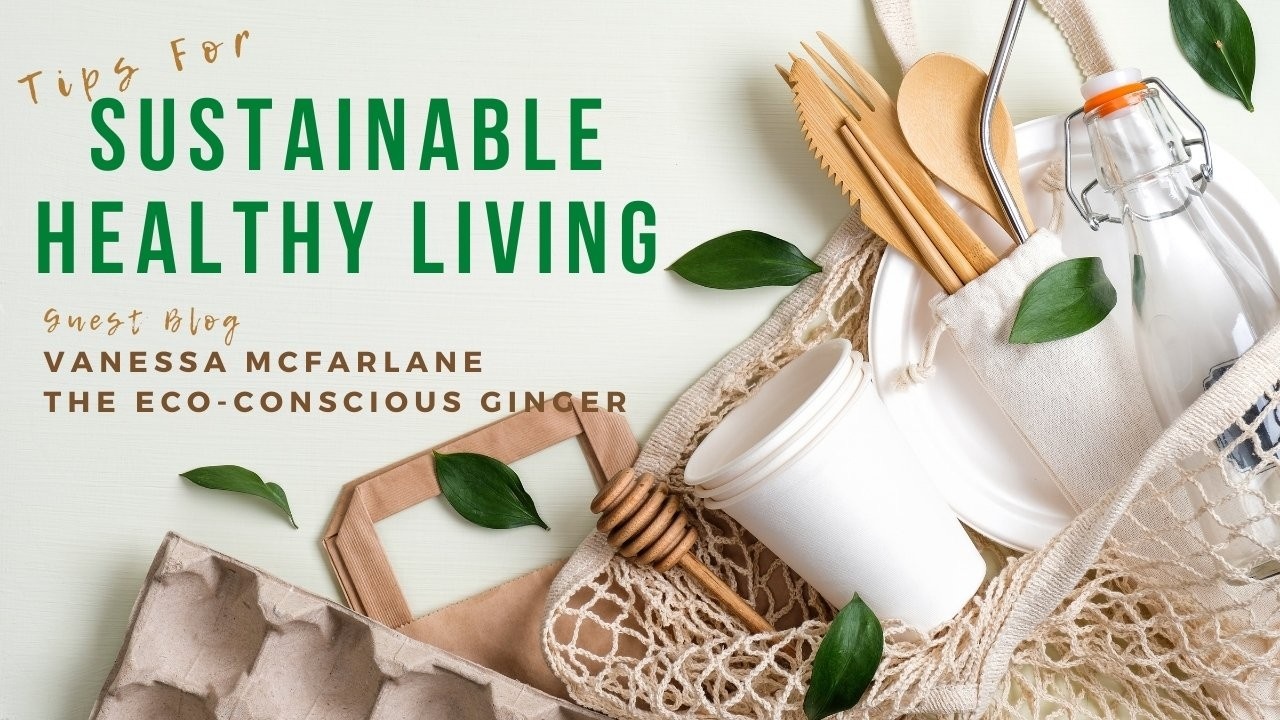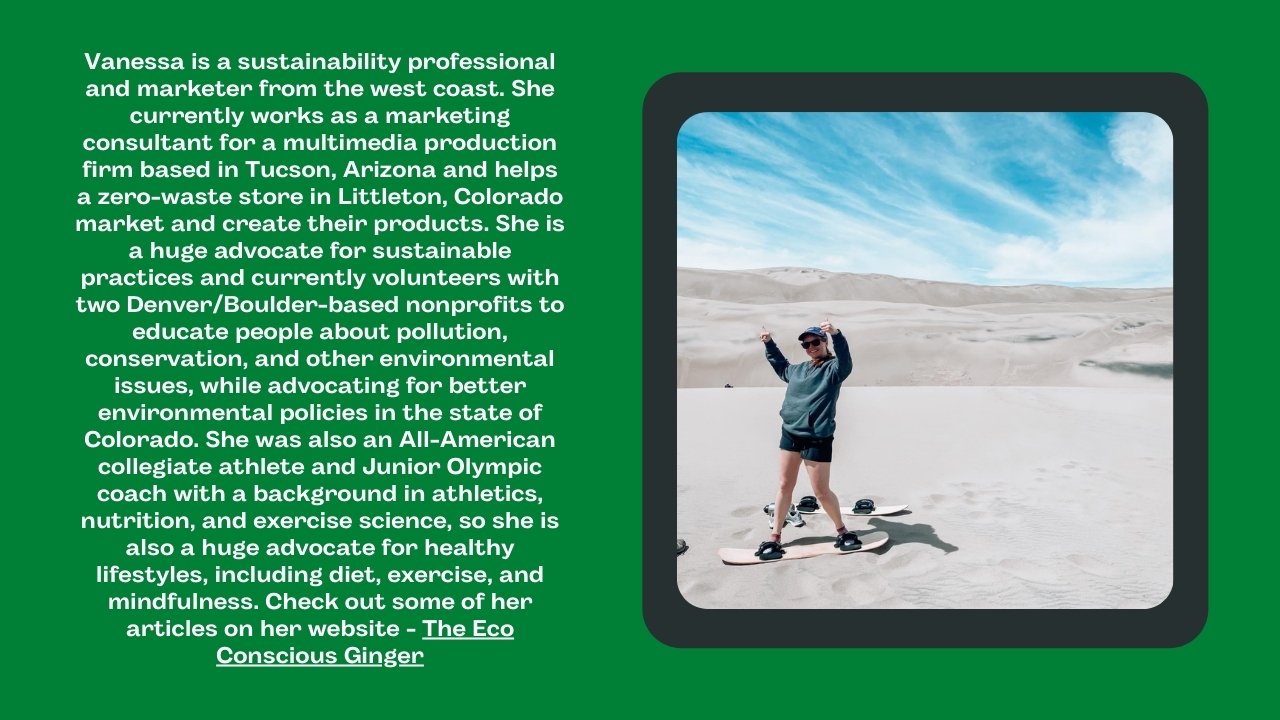
Support Your Health Journey and the Planet
Apr 18, 2021Today’s post was written by guest author Vanessa McFarlane. Vanessa is a huge advocate for sustainable practices and currently volunteers with two Denver/Boulder-based nonprofits to educate people about pollution, conservation, and other environmental issues while advocating for better environmental policies in the state of Colorado.
This month is April, which means it’s Earth Month!
Because it’s Earth Month, I thought I’d share some sustainable living tips that can actually help with your health journey.
Sustainability and Health
Sustainability and health are not mutually exclusive. In fact, a lot of toxic chemicals in products you use every day are extremely bad for your health, causing cancer and other diseases, and horrible for the environment. Additionally, that one material you use a lot, called plastic, is in your food, water, and air. Plastic is everywhere and because of our growing plastic consumption, a lot of it gets littered into our environment; when it breaks down into microplastics, those microplastics are everywhere, so we cannot help but breathe them in. Also, you consume about a credit card worth of plastic per week, and if you consume a lot of seafood, you’re consuming A LOT more plastic. Plastic is made from petroleum (GROSS) and it’s polluting our oceans and other natural habitats. There’s really no way to completely avoid it these days until policies and manufacturers work to eliminate it. However, there are things you can do to reduce your consumption, which in turn will help eliminate a lot of unnecessary toxins in your body.
Plastic Reduction Tips:
-
Check out zero-waste markets! There are tons of them in Denver. You can find a comprehensive list of them here:
-
Zero-waste markets offer alternatives to plastic items, which usually last a lot
longer. Plus you can recycle, compost, or reuse a lot of these items. -
At zero-waste markets, you can shop in bulk and refill your items! Yes refill, like
the old milkman used to do! Take your empty containers of lotions, laundry detergent, shampoo, conditioner, etc., and refill them! You’ll get non-toxic chemicals, save money, and significantly cut down on plastic! Some bulk stores even offer food bulk items, which again can be refilled. I like to use Mason jars to refill a lot of my products.
-
-
Buy in bulk whenever it makes sense. Try to buy food in paper, glass, or aluminum packaging instead of plastic. For example, instead of buying pasta wrapped in plastic, buy it packaged in cardboard; it’s usually a bit cheaper too.
-
Take your own grocery bags to the store! And yes, you can most definitely still do this during COVID. A lot of stores will just make you pack your own groceries, but whatever! You’ll also get 5 cents off your purchase per bag if you shop at Sprouts.
-
Drink water out of a reusable bottle that’s BPA-free or better yet, aluminum! Plastic
water bottles contain Bisphenol-A (BPA), which is an extremely toxic substance. The chemical is a hormone disrupter and has been linked to serious health issues such as cancer, diabetes, and cardiovascular disease. Plus you’ll save a TON of money by just reusing the same water bottle. I use a Kleen Kanteen and I love it! It’s 64 ounces, so I am definitely drinking the amount of water I need to be drinking. On a side note too, reusable bottles tend to be a lot bigger, even the smallest ones, which hold more water than a regular plastic bottle. That makes it easier to keep hydrated and keep track of exactly how much water you’re drinking.
-
Avoid buying things you don’t need. This is for everyone’s sake. And your health too. When you buy less stuff and learn to live minimally or with what you need and “brings you joy,” your mental health benefits. There’s less stress and stuff to worry about. In turn, your physical health benefits from a healthy mindset.
More on Recycling Plastics
When it comes to recycling, I highly encourage you to do your research. A lot of plastic products that are “recyclable” are NOT actually recyclable. Oftentimes, people fall into wish cycling, which is when they are not sure if a plastic product is actually recyclable, but out of feeling guilty about having used that product, they will recycle it anyways. (Rule of thumb is plastic jars, jugs, tubs, and bottles numbered 1, 2, or 5 are usually accepted by most recyclers). If you know who your recycler is, check out their guides. They’re incredibly useful and have actually helped me avoid a lot of unnecessary plastic. This is just another great way to get into the habit of avoiding single-use plastic.
Move Your Body, Help the Planet
Another way to live more sustainably is to walk or ride a bike whenever you can. It can be difficult to avoid driving, depending on where you live, but if you’re in a metropolitan area, consider walking, biking, or even taking public transit. Most of our CO2 emissions come from the transportation sector. Additionally, living in suburbs and driving has made the majority of Americans live more sedentary lifestyles, which has increased obesity and health problems massively. Riding a bike or walking is great exercise, less damaging to the environment, and overall just great for your health!
Nutrition Notes
Lastly, your diet plays into sustainability a lot. I won’t go into veganism or vegetarianism, although if you’re interested in converting your diet towards a plant-based one, good for you! I would also recommend doing your research for best practices.
Meat consumption does affect the environment, but you can still consume animal proteins without causing damage. Since most store-bought meat products are extremely processed and toxic for your body, consider supporting your local farmers and ranchers. Not only are you helping your health and the planet, but you are also supporting small businesses that oftentimes, struggle to get through. If you live in Denver, there’s a farmer’s market at Union Station where a lot of Colorado farms sell their produce. There are also many farmer’s markets across Denver, including one in Cherry Creek, Lakewood, etc. Check out Mile High Farmers for a list of local farmers to support. All of these farmers have ethical practices when it comes to raising their cattle and other farm animals. Mile High Farmers is a nonprofit organization that advocates for farming rights and helps local farmers and ranchers stay in business.
Contrary to popular belief, hunting is a lot more sustainable and ethical than buying meat from a store. Most store-bought meat is not ethically made (cows sit crowded in feedlots with no room to graze and live off of corn-based diets) and is full of carcinogens (chemicals found in cigarettes). If you are into outdoor sports and like to hunt, I definitely encourage this as a way to consume meat. If you do buy meat at your local grocery store, look for grass-fed labels. These animals were treated much more ethically and allowed to graze.
There are a lot of ways to practice sustainable living and live healthily. In fact, most sustainably conscious people are incredibly healthy – they are active because they love being outside, avoid toxic substances, eat a plant-enriched diet, and cut down on their consumption. Anything that you can do to help the planet will help your health. We cannot live in a toxic and polluted world and expect to be healthy. Go outside more, ride your bike more, and avoid single-use plastics as much as possible.

Are you overwhelmed by all of the conflicting information regarding health, hormones, nutrition, and weight management?
Join me once a month for a FREE "Ask Me Anything" live Zoom sesh! I'll answer all the questions you've been spending so much time searching the internet for.









